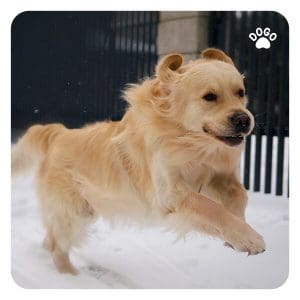
Understanding Hyperactivity in Dogs
Before delving into strategies to calm down a hyper dog, it’s crucial to comprehend the root causes of their hyperactivity. Dogs may exhibit hyperbehavior due to breed tendencies, lack of mental and physical stimulation, or simply an excess of energy. Age can also play a role, as younger dogs often have more energy to burn. Moreover, underlying health issues or anxiety can contribute to hyperbehavior. Recognizing these potential factors can help tailor strategies to address the specific needs of your dog.
Creating a Calm Environment
One effective way to help a hyper dog calm down is by creating a serene and peaceful environment. Dogs are incredibly perceptive to their surroundings, and a chaotic or overly stimulating environment can exacerbate their hyperactivity. Establishing a routine for feeding, exercise, and rest can provide a sense of predictability, which in turn can help your dog feel more at ease. Additionally, providing a designated, comfortable space for your dog to retreat to when feeling overwhelmed can be immensely beneficial.
Physical and Mental Stimulation
Physical and mental stimulation are key components in managing a hyper dog’s behavior. Regular exercise, such as daily walks, runs, or playtime, can help release pent-up energy and reduce hyperactivity. Mental stimulation is equally important and can be achieved through interactive toys, puzzle feeders, or training exercises that challenge your dog’s mind. Engaging in activities that stimulate both the body and mind can have a calming effect, as it helps your dog expend energy in a constructive manner.
Positive Reinforcement and Training
Training plays a significant role in managing a hyper dog’s behavior. Positive reinforcement techniques, such as rewarding calm behavior and ignoring hyperactive outbursts, can help your dog learn to self-regulate and remain calm in various situations. Obedience training, including commands like “sit,” “stay,” and “settle,” can provide your dog with the tools to control their impulses and respond to cues from you. Consistency and patience are crucial when implementing training techniques, as it takes time for dogs to learn and internalize new behaviors.
Nutrition and Health Considerations
A dog’s diet and overall health can impact their behavior, including hyperactivity. Ensuring that your dog is receiving a balanced diet with appropriate nutrition is essential for their well-being. Additionally, regular veterinary check-ups can help identify any underlying health issues that may be contributing to your dog’s hyper behavior. Discussing your concerns with a veterinarian can provide valuable insights and potential solutions to address your dog’s hyperactivity from a holistic standpoint.
Seeking Professional Guidance
In some cases, managing a hyper dog’s behavior may require the expertise of a professional dog trainer or behaviorist. These individuals can assess your dog’s specific needs and develop a tailored behavior modification plan. Their guidance and support can be invaluable in addressing complex behavioral issues and implementing effective strategies to help your dog achieve a calmer demeanor.
Calmly and patiently addressing a hyper dog’s behavior can lead to significant improvements in their overall well-being and your relationship with them. By understanding the factors contributing to their hyperactivity and implementing targeted strategies such as creating a calm environment, providing physical and mental stimulation, using positive reinforcement and training, considering nutrition and health, and seeking professional guidance when needed, you can help your hyper dog find a sense of balance and tranquility. Remember, every dog is unique, so it’s essential to tailor your approach to suit your dog’s individual needs. With time, consistency, and empathy, you can make a positive difference in your hyper dog’s life.






